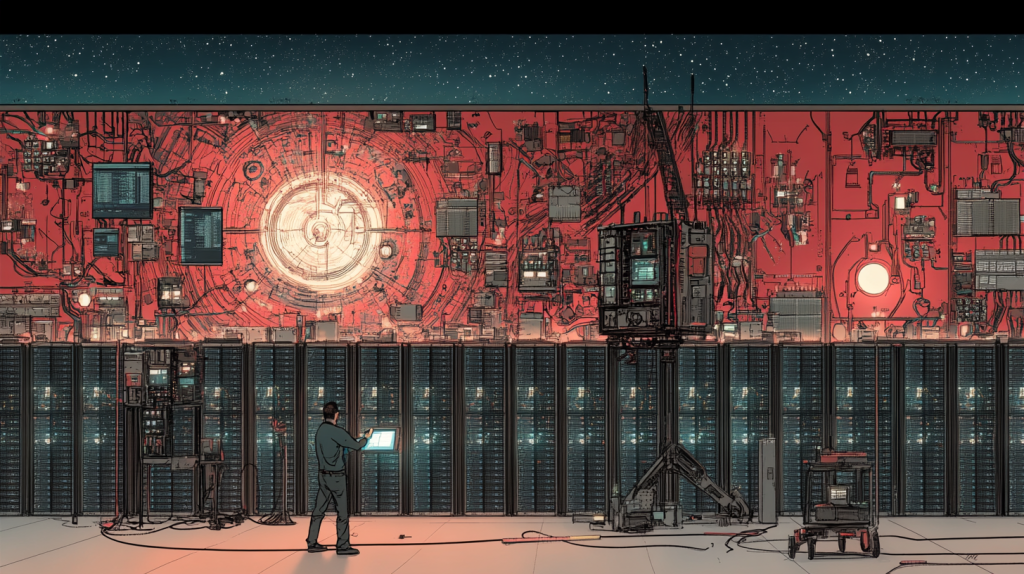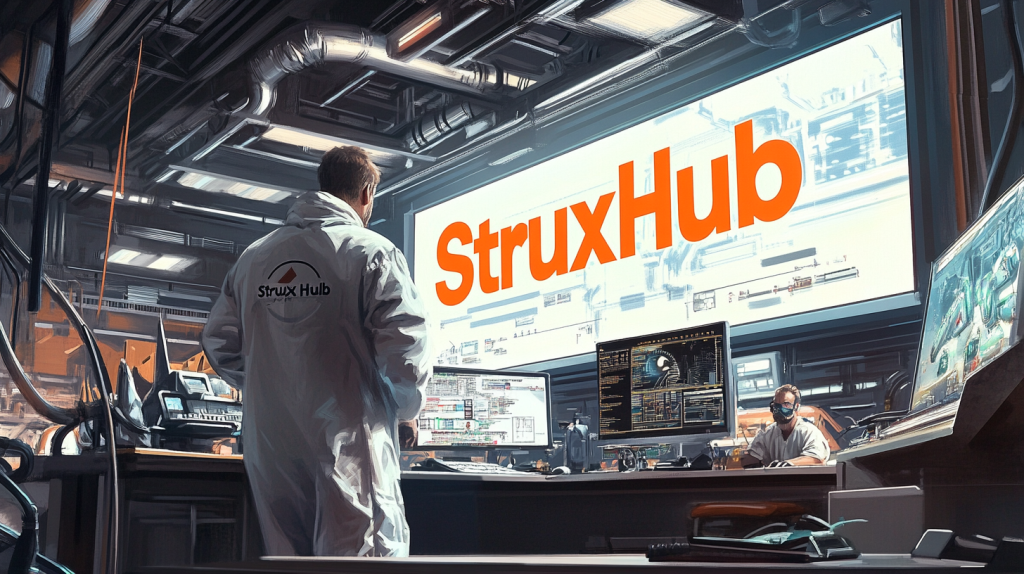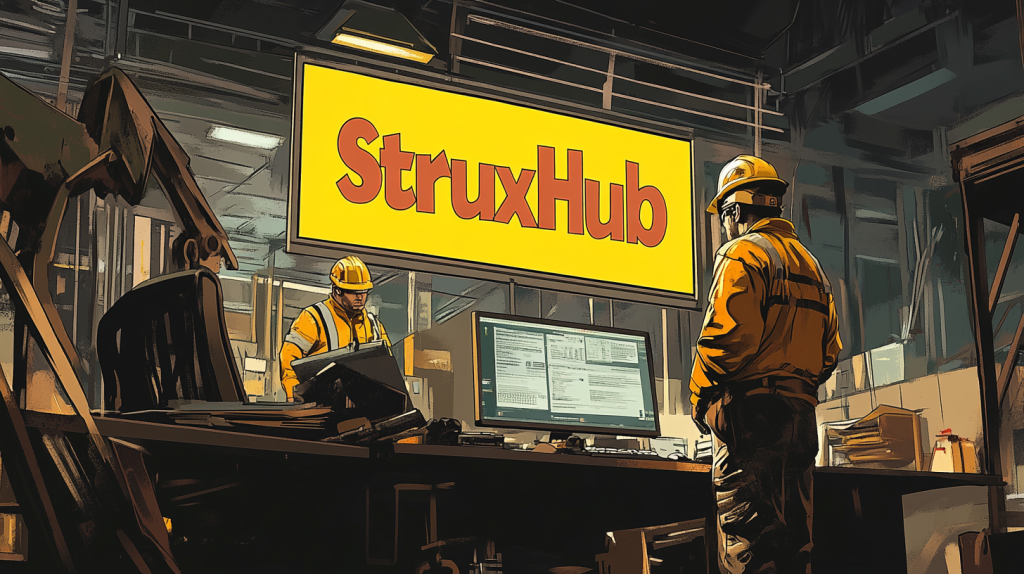Data Center Construction Document Control Solutions: How to Manage Contracts and Regulatory Documents in Data Center Construction
Table of Contents:

Managing contracts and regulatory documents in data center construction is a critical yet often overwhelming task. Given the strict compliance requirements, extensive contractor agreements, and evolving project scopes, maintaining accurate and accessible documentation is essential for a smooth and legally sound construction process. Without proper document control, teams risk miscommunication, regulatory violations, project delays, and increased costs—all of which can disrupt operations and affect project viability.
In hyperscale data center construction, where projects span multiple locations, involve hundreds of vendors, and require adherence to strict industry standards, document control must be streamlined, automated, and centralized. From permit approvals and safety compliance records to vendor contracts and change orders, effective document management ensures that all stakeholders have access to the latest, most accurate project information.
This article explores the importance of document control solutions, best practices for managing regulatory compliance, and the role of modern construction management platforms in ensuring efficiency, accuracy, and project success.
Why Document Control Matters in Data Center Construction
Data center construction projects require a vast amount of documentation to ensure compliance, efficiency, and legal protection. Without structured document control, projects face several challenges, including:
- Regulatory Compliance Risks: Hyperscale data centers must meet industry standards such as Uptime Institute Tier Certifications, ANSI/TIA-942, and ASHRAE cooling guidelines. Missing a permit deadline or failing an audit due to incomplete documentation can result in costly project delays or shutdowns.
- Contract Mismanagement: Poor document tracking can lead to disputes over contract terms, misalignment between vendors, and uncontrolled project scope changes. Ensuring all stakeholders work from the latest approved contract versions is essential to avoiding legal conflicts.
- Version Control Issues: With multiple teams handling the same documents, errors, miscommunication, and outdated information can become major risks. Without a proper version control system, teams may unintentionally work with outdated blueprints, regulations, or compliance guidelines.
By integrating advanced document control solutions, construction teams can improve collaboration, ensure regulatory compliance, and enhance operational efficiency.
Best Practices for Managing Contracts and Regulatory Documents
Proper document control requires a structured approach to managing permits, contracts, compliance records, and construction documentation. Below are key strategies for effective document management in data center construction.
1. Centralize Documentation in a Digital Platform
- Traditional paper-based systems and scattered spreadsheets make tracking and retrieving important documents inefficient.
- Cloud-based document management systems ensure that all stakeholders have real-time access to the latest contracts, permits, and regulatory records.
- Platforms like StruxHub provide version control, automated tracking, and secure cloud storage, allowing teams to collaborate seamlessly without the risk of working on outdated documents.
2. Automate Compliance and Permit Tracking
- Automated compliance tracking helps teams monitor upcoming permit deadlines, inspection requirements, and certification renewals.
- By integrating automated reminders and approval workflows, construction teams can prevent costly fines and ensure on-time regulatory submissions.
- Compliance dashboards offer real-time tracking of environmental impact assessments, OSHA safety protocols, and energy efficiency certifications, ensuring full regulatory adherence.
3. Implement Contract Lifecycle Management (CLM) Software
- CLM tools enable teams to digitally track contract creation, negotiations, approvals, and amendments in a centralized system.
- By automating contract execution, renewal reminders, and change orders, project managers eliminate manual errors and legal risks.
- Smart contract analytics help identify potential contract disputes, vendor performance issues, and financial discrepancies, ensuring smooth vendor relationships.
4. Integrate Document Control with Scheduling and Vendor Coordination
- Linking document management with project scheduling ensures that permits and approvals align with construction timelines.
- A well-integrated system prevents scheduling delays due to missing compliance paperwork or unapproved blueprints.
- Vendor agreements can be tied to milestone tracking and performance evaluations, ensuring accountability across all subcontractors and suppliers.
5. Enforce Strict Version Control and Access Permissions
- A structured version control system prevents teams from using outdated safety guidelines, engineering designs, or contract amendments.
- Role-based access control ensures that only authorized personnel can modify or approve critical project documents, reducing the risk of unauthorized changes.
- Digital audit trails provide full transparency over document modifications, making compliance audits and dispute resolution easier.
By implementing these best practices, construction teams can reduce document mismanagement, maintain regulatory compliance, and improve overall project efficiency.
Related Articles:
Best Guide to Data Center Construction Management Software: Manage Scheduling, Deliveries, and Compliance for Hyperscale Projects
Data Center Construction Deliveries: Best Real-Time Tracking Solutions for Managing Data Center Construction Deliveries
Data Center Construction: Top Delivery and Scheduling Strategies for Redundant Power Systems in Data Centers

How Digital Document Management Tools Improve Compliance and Efficiency
Construction document control has evolved from manual tracking and filing cabinets to intelligent, cloud-based platforms that automate, centralize, and simplify contract and regulatory documentation.
1. Real-Time Document Access for All Project Stakeholders
- Ensures that engineers, project managers, vendors, and regulators have access to up-to-date compliance records, contracts, and project specifications.
- Reduces email chains, manual approvals, and miscommunication that can cause costly rework.
2. Automated Compliance Monitoring and Alerts
- Tracks inspection deadlines, permit renewals, and certification requirements, preventing unexpected regulatory delays.
- Sends automated notifications for approvals, ensuring that required documents are processed on time.
3. AI-Powered Risk Management and Predictive Analytics
- Identifies potential compliance violations, missing contracts, or document discrepancies before they impact project progress.
- Uses machine learning to detect patterns in vendor contract performance, preventing cost overruns and project disputes.
By adopting digital document control solutions, data center construction teams can increase efficiency, reduce compliance risks, and streamline project execution.
Ensuring Security and Accessibility of Construction Documents
One of the biggest concerns in document control is balancing security with accessibility. Construction projects involve multiple stakeholders, from project managers and engineers to government inspectors and financial teams, all of whom require different levels of document access. Unauthorized access, accidental modifications, or lost documents can disrupt operations, making security protocols an essential part of document management.
Implementing role-based access control ensures that each team member can only view or edit documents relevant to their responsibilities. This prevents unauthorized changes and reduces the risk of miscommunication due to incorrect information. Additionally, using encrypted cloud storage and multi-factor authentication safeguards sensitive contract details and compliance records from cyber threats or accidental deletions.
By integrating automated access permissions, secure backup systems, and document recovery protocols, teams can ensure that critical records remain protected while remaining easily retrievable when needed.

StruxHub
Experience the power of StruxHub today and witness firsthand how it can revolutionize your construction operations.
Integrating Document Control with Project Scheduling and Workflow Automation
For document control to be truly effective, it must be linked with project scheduling and workflow automation. Construction delays often stem from waiting on permit approvals, contract sign-offs, or compliance documentation. By integrating document management with scheduling tools, project managers can proactively adjust timelines based on real-time document status updates.
For example, if a permit is delayed, automated scheduling systems can adjust workforce allocation, shift resource deployment, or prioritize other tasks to avoid project downtime. Additionally, linking vendor contracts with project milestones ensures that payment schedules, delivery deadlines, and work completion reports align with contractual obligations, reducing disputes and financial discrepancies.
Platforms like StruxHub automate these processes, ensuring seamless communication between document control systems and project timelines. This allows for efficient contract execution, real-time compliance tracking, and dynamic scheduling adjustments to keep construction moving forward without unnecessary delays.
How StruxHub Enhances Document Control in Data Center Construction
StruxHub offers a centralized platform designed to manage contracts, permits, compliance records, and regulatory submissions seamlessly. Unlike traditional document management methods that rely on manual tracking and email-based approvals, StruxHub automates document workflows, contract approvals, and real-time compliance tracking to keep construction teams aligned and audit-ready.
Key Features of StruxHub’s Document Control System:
- Centralized Document Repository – Provides secure cloud storage for contracts, permits, and regulatory documents, ensuring teams always work with the latest files.
- Automated Approval Workflows – Reduces bottlenecks in contract negotiations, change orders, and compliance submissions, ensuring faster processing times.
- Real-Time Compliance Tracking – Tracks permit deadlines, inspection schedules, and certification requirements, preventing regulatory violations.
- Smart Version Control – Prevents teams from using outdated blueprints or conflicting contract amendments, ensuring accuracy across all construction phases.
By integrating document control with vendor coordination, scheduling, and compliance tracking, StruxHub ensures that data center construction projects stay on track, within budget, and free from unnecessary regulatory risks.
Unlock the Full Potential of Your Construction Projects with StruxHub
StruxHub enhances efficiency and coordination across all project phases, providing a single source of truth that eliminates silos and fosters collaboration. Real-time updates, financial management tools, and seamless commvunication features ensure that all team members and stakeholders are aligned and informed, reducing the risk of errors and delays. With comprehensive solutions for document management, risk mitigation, and quality control, StruxHub maintains project integrity and safety, while mobile access and integration capabilities further enhance project flexibility and efficiency.
StruxHub’s Key Features and Benefits:
- Advanced Delivery Management: Automate and optimize your delivery schedules, ensuring materials arrive just in time, every time.
- Site Communication: Utilize georeferenced maps and instant messaging to keep every team member informed and aligned.
- Construction Materials Management: Track inventory levels and manage materials procurement with ease, reducing waste and avoiding project delays.
- Construction Safety & Inspection Workflows: Implement customizable mobile forms for conducting safety inspections and managing compliance documentation effortlessly.
- Short-Term Scheduling: Visualize project tasks with detailed floor plans, linking each activity to specific locations for better planning accuracy.
- Construction Resource Management: Efficiently allocate personnel and equipment, maximizing productivity and reducing idle time.
StruxHub’s Product Offering:
- StruxHub Deliveries: Simplifies the coordination of incoming deliveries, ensuring materials and equipment are precisely timed to project needs.
- StruxHub Logistics: Offers intelligent site logistics planning, from crane scheduling to space allocation, for smoother operations.
- StruxHub Safety: Elevates on-site safety standards with easy-to-use tools for inspections, permits, and incident reporting.
- StruxHub Scheduling: Enhances project timelines with intuitive scheduling tools that ensure tasks are completed efficiently and on time.
With StruxHub, construction companies can look forward to a streamlined, more efficient project execution that delivers on time and within budget. Embrace the power of innovation and take your construction projects to the next level.
Don’t miss out on the opportunity to optimize your construction management processes with StruxHub. Sign up for a free demo today. Let’s build smarter, together.

FAQ
1. What are the most common document control challenges in data center construction?
Managing regulatory documents, contracts, and permits across multiple teams can lead to version control issues, compliance delays, and miscommunication. Without a centralized system, teams risk using outdated information, missing permit deadlines, or failing audits.
2. How does document control improve regulatory compliance?
Automated document tracking ensures that permits, inspections, and compliance reports are submitted on time. Digital platforms offer real-time alerts for upcoming deadlines, version control for legal documentation, and secure audit trails to ensure compliance.
3. Why is version control critical in data center construction?
Without proper version control, teams may work with outdated designs, compliance checklists, or contract amendments. Implementing a cloud-based document system with role-based permissions ensures that everyone works from the most current, approved documents.
4. What role does AI play in document control solutions?
AI-powered document management tools help analyze contract risks, detect missing compliance paperwork, and automate approval workflows. These tools improve efficiency by predicting potential compliance issues and ensuring timely document submission.
5. How does StruxHub improve document management in construction?
StruxHub automates document approvals, integrates compliance tracking, and provides real-time document access to prevent delays and errors. It centralizes contracts, permits, and compliance records in a secure, cloud-based environment.
6. How can document control solutions reduce disputes between contractors and vendors?
Disputes between contractors and vendors are common in data center construction, often arising from contract misinterpretations, unapproved change orders, or missing compliance documents. When contract details are not properly tracked or managed, misunderstandings about scope of work, payment terms, or delivery schedules can cause delays and financial losses.
By using a centralized document control system, all parties have access to the latest, approved versions of contracts, agreements, and project specifications. These platforms provide digital timestamps, version tracking, and audit trails, ensuring that any modifications or approvals are documented and accessible. Additionally, automated alerts notify teams of pending approvals, reducing the likelihood of unsigned contracts causing disputes.
Having real-time visibility into contract terms, amendments, and compliance checklists helps resolve conflicts quickly. Platforms like StruxHub provide a single source of truth, preventing miscommunication and ensuring that every stakeholder operates based on the same set of documents. This transparency reduces legal risks, eliminates confusion, and helps maintain productive relationships between contractors and vendors.
7. What are the risks of using outdated documentation in data center construction?
Using outdated documentation in data center construction can lead to compliance violations, construction errors, financial penalties, and project delays. If teams work off old blueprints, incorrect regulatory requirements, or an outdated contract, the project can suffer from costly rework, failed inspections, and misaligned vendor expectations.
For example, an engineer working with an older version of the site plan may install infrastructure that is no longer part of the final approved design. If the issue is discovered late in the construction process, it can require expensive corrections and delay multiple phases of the project. Additionally, expired permits or compliance certifications may result in fines, forced work stoppages, or legal liabilities.
A real-time document control system with version tracking and automated updates ensures that teams always work with the most current documents. Digital platforms allow project managers to set role-based access controls, restrict outdated document usage, and provide instant updates whenever new compliance requirements or design changes are made. This proactive approach prevents costly mistakes and ensures that construction stays aligned with regulatory and project goals.
8. How can cloud-based document control improve collaboration in data center construction?
Cloud-based document control significantly enhances collaboration in data center construction by ensuring that all stakeholders—contractors, suppliers, project managers, and regulatory bodies—have real-time access to critical project documents. Traditional paper-based or email-driven document management often leads to version control issues, lost files, and delays in approvals, creating bottlenecks in construction progress.
By using a cloud-based platform, teams can:
- Access and share updated project documents from anywhere, ensuring that remote teams and on-site workers are aligned.
- Automate version control so that outdated documents are archived and only the most current versions are available for use.
- Enable real-time collaboration by allowing multiple users to review, edit, and comment on documents simultaneously, streamlining the approval process.
Additionally, cloud-based systems integrate with construction scheduling, compliance tracking, and vendor management tools, ensuring that document workflows align with project milestones. This level of efficiency reduces miscommunication, speeds up approvals, and improves overall project transparency and accountability.
9. How do automated document workflows benefit regulatory compliance?
Regulatory compliance in data center construction requires accurate documentation, timely submissions, and adherence to evolving industry standards. Manual processes often lead to delays, lost paperwork, or missing approvals, which can result in compliance violations, legal fines, and project halts.
Automated document workflows address these challenges by:
- Digitally tracking permit applications, inspection reports, and compliance checklists, ensuring deadlines are met.
- Providing automated alerts and reminders for document expirations, certification renewals, and regulatory updates.
- Ensuring that required compliance approvals are secured before moving forward with critical project phases, reducing the risk of non-compliance.
With automation, project managers no longer need to manually chase down approvals or track submissions in spreadsheets. Systems like StruxHub offer real-time dashboards that display compliance progress, flag missing approvals, and integrate with legal requirements. This structured approach ensures that data center projects remain compliant, reducing legal risks and avoiding costly regulatory setbacks.
10. How can AI and machine learning improve document control in data center construction?
AI and machine learning are revolutionizing document control in data center construction by making document tracking, compliance monitoring, and risk management more efficient. Instead of relying on manual data entry and human oversight, AI-powered systems automate document classification, flag potential errors, and predict risks before they impact the project.
AI-driven document control tools can:
- Automatically extract key information from contracts, permits, and regulatory filings, reducing manual workload.
- Detect missing signatures, outdated compliance documents, or inconsistent contract terms, alerting project managers before issues arise.
- Analyze historical project data to identify patterns in document delays, contract disputes, or compliance bottlenecks, allowing teams to implement proactive solutions.
Additionally, machine learning can optimize approval workflows by learning how long specific permit approvals or contract negotiations typically take. This predictive capability allows teams to better estimate approval timelines, preventing unexpected delays. AI-powered tools also improve document security by detecting unauthorized access attempts or tracking changes to critical files, ensuring that sensitive project data remains protected.
By integrating AI and machine learning into document control solutions, data center construction teams can increase efficiency, reduce compliance risks, and ensure a smoother, more predictable project workflow.




